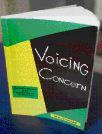
Voicing Concern:
The Social Witness of
the Jamaica Council of Churches
Author: Neville Callam
Reviewer: Billy Hall
A PUBLICATION that documents significant decisions and public statements of a church body as important as the Jamaica Council of Churches (JCC) is important, for much of local church history is yet to be recorded. Congratulations, then, to the Rev. Neville Callam for his vision and dedication in devoting approximately a year of his life to the researching, compiling and production of a book that is undoubtedly a useful church document.
SHORTCOMINGS
But, having said that, it is necessary to draw attention to the shortcomings of the work.
The selections are quite uneven, which is understandable in a work of this selective nature. What is less understandable is the exaggerated unevenness that goes without any explanation of the dramatic differences.
For example, the decade of the 60s has only three references (all on gambling). Clearly then, it is in the 70s (during Michael Manley's administration) that the JCC began to make frequent public statements, when 22 releases were issued, followed by a drop to eight in the 1980s (Edward Seaga's administration), picking up again under Patterson in the 1990s, when it seems the statements mushroomed (49), only to be followed by dramatic decline since 2000.
Well, thanks to Rev. Callam, the documentation for that dramatic decline is preserved for handy reference, even if readers have to make their own assessment.
Fortunately, the book helps such evaluation somewhat, for Rev. Callam says in the book that after a period in which the JCC faced "considerable criticism" for its proclamations, the Council "took a decision that, instead of making frequent public statements on developments of public interest, it would, from time to time, seek opportunity for direct dialogue with the parties concerned."
ENHANCE THE WORK
No comment is made in the book as to whether this important decision has turned out to be for the better or worse. But whether that decision was good seems doubtful in light of the remarks in the farewell presidential speech by Stanley Clarke (JCC President 1997-2000), who said then that the JCC should adjust its operational policy to "facilitate prompt response to issues of the moment."
Several features would have enhanced this work, such as a list of the current members of the JCC, to go along with the very helpful list of presidents, and of secretaries, with years served, provided in the appendices. Certainly, some explanation seems necessary to account for the historical founding 'gap' between 1922 and 1941.
In regard to typography, the headings are unattractive. They are presented in body-copy type with underlines that detract as a design feature. There are no screens to highlight anything, such as the scholarly references. Editing lapses embarrass, notably in the introduction, where it states, "Today, the Church of God in Jamaica ARE no longer members of the Council".
In fairness, this book builds on the previous contribution of Anglican priest Rev. Edmund Davis, the current rector of St. George's in Kingston. He was undoubtedly the most high profile and dynamic JCC general-secretary (1978-86) and in the 1980s he produced two important historical works, Men of Vision (1981) and Courage and Commitment (1988). Some acknowledgment of his academic contribution would have improved the introduction, and perhaps would have been otherwise done if the book had a foreword.
The approximately 190 pages of this book will certainly be a welcome addition to local church history, much of which remains to be written, but it is to be hoped that for other such books, professional publishing skills will be employed in the pursuance of excellence.
Publisher: Pelican Publishers Ltd.

